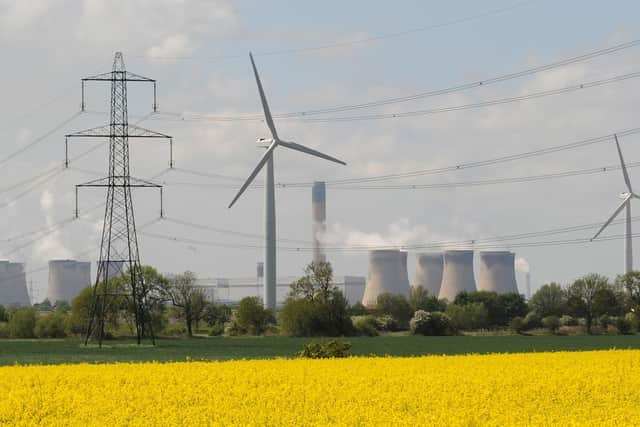Energy crisis: Why Yorkshire needs to look within to meet its energy needs - Mark Casci
If the water in your tap is consistently there and at the required temperature you will not give it a second thought and will probably even struggle to identify your provider if you are not the bill payer.
Sadly, I would imagine there is not a household or business in Britain not aware of their energy provider at the moment.
Advertisement
Hide AdAdvertisement
Hide AdEnergy bills for 15 million households increased in October by at least £139 to an average of £1,277 a year – a record high – under Ofgem’s latest price cap.


The increase has been driven by a rise of more than 50 per cent in energy costs over the previous six months, with gas prices hitting a record high.
And, as a result of this, inflation is now at its highest level for 10 years.
Indeed, a senior Bank of England official this week said that it will “comfortably” exceed five per cent next year, with little sign of it falling back towards the Bank’s official 2 per cent target.
Advertisement
Hide AdAdvertisement
Hide AdThe crisis with fuel has underscored Britain’s colossal addiction and reliance on gas.


Government figures show that more than 22 million households are connected to the gas grid and last year, 38 per cent of the country’s gas demand was used for domestic heating, 29 per cent for electricity generation and 11 per cent for industrial and commercial use.
This comes at a time when calls have been made for Russia’s state-backed gas company Gazprom to be subject to an investigation concerning its role in the soaring gas prices across the continent.
The prospect of a short-term solution to the crisis is desperately weak and it is generally recognised that prices are set to stay on the high side for the next year or so.
But how do we avoid further surges in the long run?


Advertisement
Hide AdAdvertisement
Hide AdOne way we can do this is to take great control of how we power our homes and businesses.
While the high cost of gas is not confined to Russia’s pipelines, it is a factor, and we are in a situation in which we rely upon a state with an, at best, questionable record on human rights and international ethics.
Given that we have a national and global imperative to reduce emissions, it is clear that the time has come for a new approach.
Two events this past week gave me cause for comfort on this score.


Advertisement
Hide AdAdvertisement
Hide AdIn North Yorkshire, Drax Group outlined a £3bn investment programme that will see it double its biomass pellet production by 2030.
The pellets, a key ingredient in the power firm’s drive toward net zero, will be drawn from further plants around North America.
While this may not see the region and country becoming self-sufficient when it comes to its supply chain, it is at least with two of our dearest and longest lasting allies in the form of the United States and Canada.
Drax added that it had made excellent progress during 2021 in advancing its BECCS (bioenergy with carbon capture and storage) project which, if approved by Government, has the potential to transport and securely store nearly 50 per cent of all UK industrial cluster CO2 emissions – up to 27 million tonnes of CO2 emissions a year by 2030.
Advertisement
Hide AdAdvertisement
Hide AdThe second announcement which brought comfort to my soul, was that made concerning South Yorkshire institution Sheffield Forgemasters.
The company has signed a Memorandum of Understanding with Rolls-Royce UK Small Modular Reactor (SMR) fleet.


The deal could see Forgemasters supply the complex, nuclear-grade demonstrator forgings as part of the regulatory process.
The idea of small modular reactors has been kicked around for a while.
Advertisement
Hide AdAdvertisement
Hide AdProfessor Sir Keith Ridgway, formally of the Advanced Manufacturing Research Centre at Rotherham, is on record as a fan.
Rolls Royce SMR estimate that each Small Modular Reactor could be capable of powering one million homes – equivalent to a city the size of Leeds.
And, given their scale, they do not contain enough hazardous waste seen at the likes of Fukushima and Chernobyl.
Good news may be at a premium but the signs for the future are encouraging.
Here’s hoping.